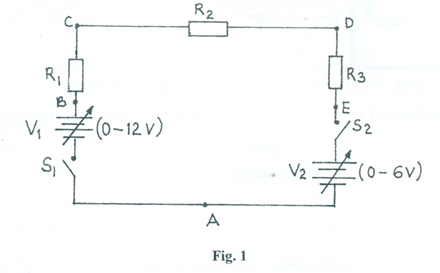Question 1
AIM: To verify Kirchhoff’s voltage law.

- Connect the circuit as shown in Fig.1.
- Ask the supervisor to check the circuit connection.
- You are provided with Table 1 and Table 2.

- Adjust V1 to 12 V and V2 to 6 V.
- Close switches S1 and S2.
- Measure voltages VAB, VBC, VCD, VDE,VEA using the multimeter across the designated points on the circuit and record the results in Table 1.
- Measure voltages VCA, VDB and VCE using the multimeter across the designated points in the circuit and record results in Table 2.
- Open switches S1 and S2
- Comment on the readings obtained in Tables 1 and 2 in terms of Kirchhoff’s voltage law.
Observation
The expected responses were:
TABLE 1
Voltage |
Value (V) |
VAB |
12.00 |
VBC |
0.77 |
VCD |
1.64 |
VDE |
3.60 |
VEA |
6.00 |
TABLE 2
Voltage |
Value (V) |
VCA |
11.23 |
VDB |
2.40 |
VCE |
5.23 |
- Correct circuit connection
- Correct reading of Value (V) in Table 1
- Correct reading of Value (V) in Table 2
- Comment on the readings obtained in Tables 1 and 2
VAB is equal to the sum of the algebraic sum of VBC, VCD, VDE and VEA.
OR VAB is equal to the sum of VBC and VCA.
OR VDB is equal to the sum of VBC and VCD.
The question required candidates to use the provided apparatus to set up a circuit, obtain voltage readings to verify Kirchhoff’s voltage laws. Candidates were able to set up the experiment and obtained required voltage values (though some had incorrect values).
Candidates were expected to comment on the values derived from the experiment. This was to ascertain their understanding about the law being tested. However, not many of the candidates performed well in this aspect.
